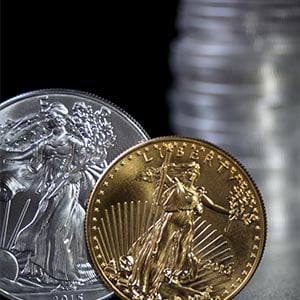(Montgomery, Alabama – April 14, 2022) – With Governor Kay Ivey’s signature on sound money legislation today, Alabama has become the second state this year to expand its sales tax exemption involving gold and silver. Alabama Senate Bill 13, championed by Sen. Tim Melson and Rep. Jamie Kiel, passed with unanimous support out of the Alabama Senate and then passed unanimously through the Alabama House before making it to the Governor’s desk. In 2019, Alabama originally removed sales taxes from most gold, silver, platinum, and palladium coins and bars. This year, SB 13 clarified that the exemption covers all common forms of bullion, removed burdensome reporting requirements, and extended the sales tax exemption until 2028. Backed by the Sound Money Defense League,
Topics:
Sound Money Defense League News considers the following as important: 6a.) Gold Standard, 6a) Gold & Monetary Metals, Featured, newsletter
This could be interesting, too:
Nachrichten Ticker - www.finanzen.ch writes Die Performance der Kryptowährungen in KW 9: Das hat sich bei Bitcoin, Ether & Co. getan
Nachrichten Ticker - www.finanzen.ch writes Wer verbirgt sich hinter der Ethereum-Technologie?
Martin Hartmann writes Eine Analyse nach den Lehren von Milton Friedman
Marc Chandler writes March 2025 Monthly
 (Montgomery, Alabama – April 14, 2022) – With Governor Kay Ivey’s signature on sound money legislation today, Alabama has become the second state this year to expand its sales tax exemption involving gold and silver.
(Montgomery, Alabama – April 14, 2022) – With Governor Kay Ivey’s signature on sound money legislation today, Alabama has become the second state this year to expand its sales tax exemption involving gold and silver.
Alabama Senate Bill 13, championed by Sen. Tim Melson and Rep. Jamie Kiel, passed with unanimous support out of the Alabama Senate and then passed unanimously through the Alabama House before making it to the Governor’s desk.
In 2019, Alabama originally removed sales taxes from most gold, silver, platinum, and palladium coins and bars. This year, SB 13 clarified that the exemption covers all common forms of bullion, removed burdensome reporting requirements, and extended the sales tax exemption until 2028.
Backed by the Sound Money Defense League, Money Metals Exchange, and in-state supporters, SB 13 now fully ensures that Yellowhammer State citizens cannot be penalized with taxation when acquiring the monetary metals for investment, to protect their savings from the ravages of inflation, or any other reason.
Stefan Gleason, President of Money Metals Exchange, explained the importance of extending the existing sales tax exemption on precious metals: “Many states surrounding Alabama (Georgia and Florida) have cultivated pro-sound money environments, eliminating sales taxes on gold and silver. Alabama savers and investors are thankful that the legislature expanded and extended the state’s exemption.”
Alabama follows Virginia which had only days earlier expanded and extended its own sales tax exemption involving the monetary metals earlier this month.
Including Alabama, 41 U.S. states now fully or partially exempt gold and silver from the sales taxes. That leaves 9 states and the District of Columbia as the primary jurisdictions that still harshly penalize citizens seeking to protect their savings against the serial devaluation of the Federal Reserve Note.
Jp Cortez, policy director for the Sound Money Defense League, noted that SB 13 is part of a growing nation trend. “Tennessee and Mississippi, both states that border Alabama, have been considering the elimination of sales taxes on gold and silver. So are Alaska, Hawaii, and New Jersey.”
States are removing sales taxes from monetary metals for the following reasons:
- Taxing precious metals is unfair to certain savers and investors. Gold and silver are held as forms of savings and investment. States do not tax the purchase of stocks, bonds, ETFs, currencies, and other financial instruments, so it makes no sense to tax monetary metals.
- Levying sales taxes on precious metals is illogical because gold and silver are inherently held for resale. Sales taxes are typically levied on final consumer goods. But precious metals are inherently held for resale, not “consumption.”
- Taxing gold and silver harms in-state businesses. It’s a competitive marketplace, so buyers in states with precious-metals sales taxes often take their business to neighboring states that have eliminated or reduced sales tax on precious metals. Coin conventions also tend to avoid the sales tax states.
- Taxing precious metals is harmful to citizens attempting to protect their assets. Purchasers of precious metals aren’t fat-cat investors. Most who buy precious metals do so in small increments as a way of saving money. Precious metals investors are purchasing precious metals as a way to preserve their wealth against the damages of inflation. Inflation harms the poorest among us – including pensioners, those on fixed incomes, wage-earners, savers, and more.
Tags: Featured,newsletter






